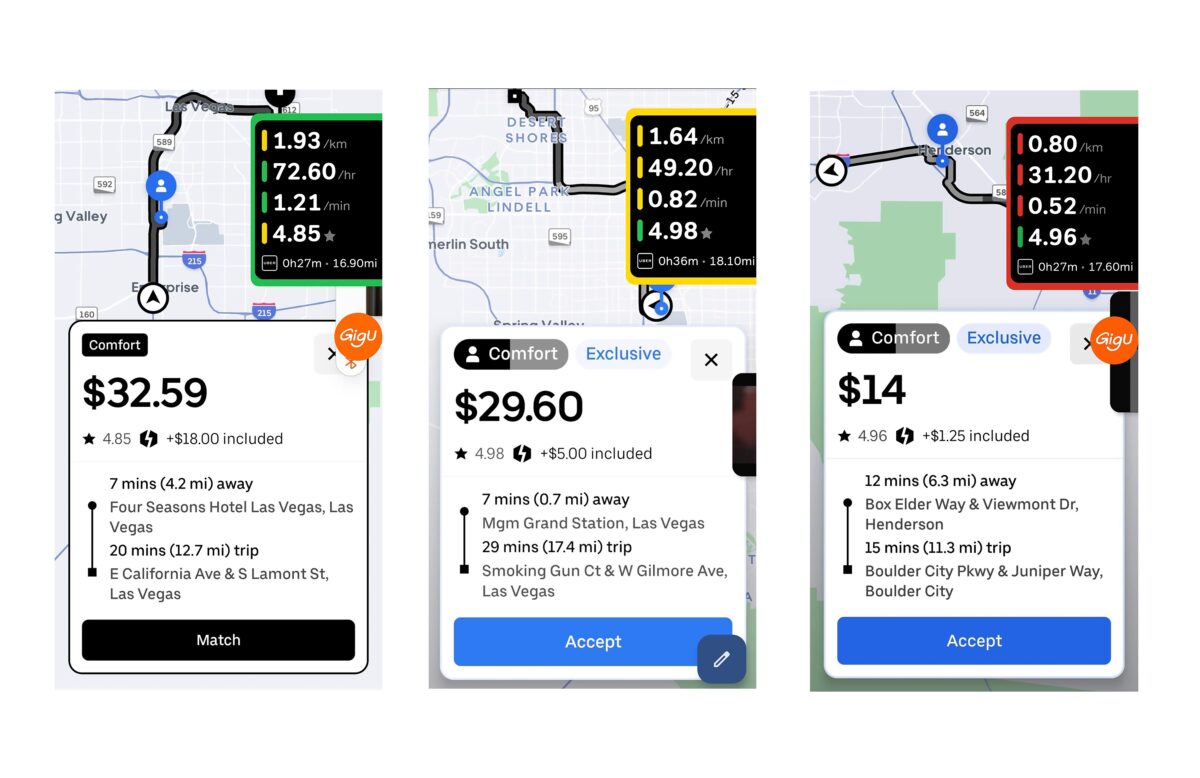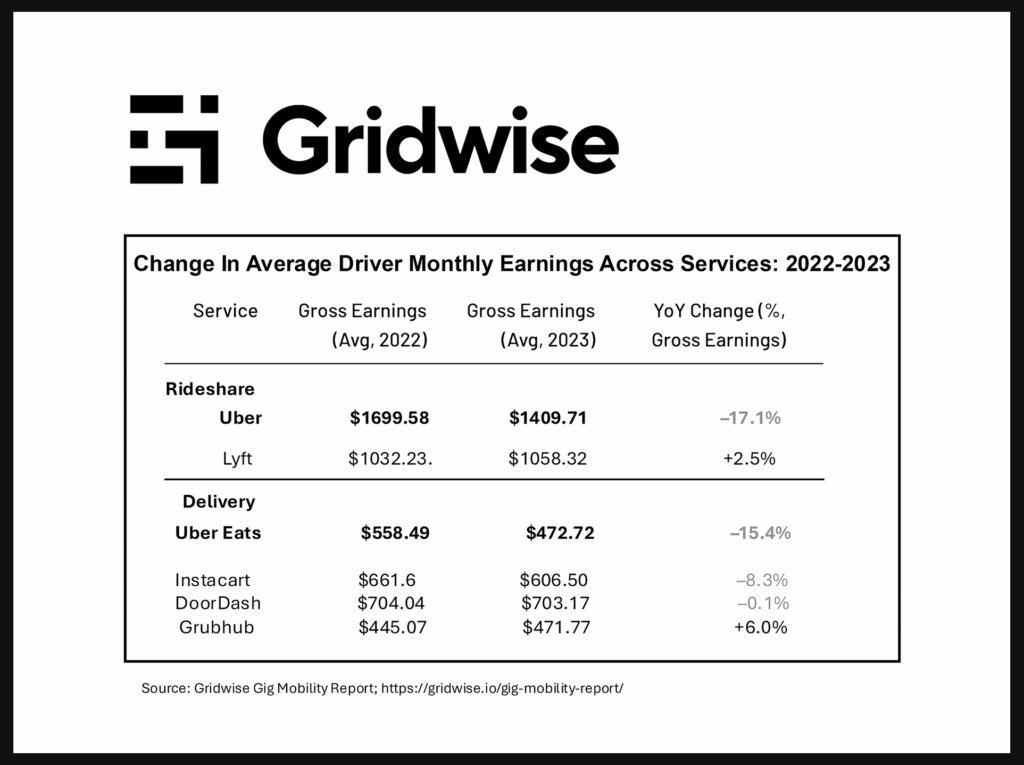After establishing itself as a formidable force in Brazil’s ride-sharing ecosystem, GigU is officially bringing its driver-empowering technology to the United States market, the company announced today. The expansion comes after GigU secured nearly $5 million in seed funding to help fuel its U.S. launch, building on a previous $1.2 million raised in March 2024. The upstart is already profitable.
GigU, which began as StopClub before its recent rebranding, has become a powerful ally for gig-economy workers in Brazil, with nearly 600,000 app downloads, more than 181,000 active users, and more than 70,000 paying subscribers.
Now, American drivers working with major platforms like Uber, Lyft, DoorDash, Grubhub, and Uber Eats can access the same tools that have helped Brazilian drivers increase their earnings by up to 30% on average since the beginning of 2025.
GigU: A Powerful Ally for Gig Workers
The company’s flagship feature, dubbed the “Cherry Picker,” helps drivers maximize profits by showing potential earnings for ride offers through an intuitive color-coded system: Green for profitable rides, yellow for acceptable options, and red for trips to avoid.
This simple but effective approach minimizes driver distraction while allowing them to make more informed decisions about which rides to accept in the roughly 10 seconds they have to decide while often actively servicing passengers and navigating through traffic.

“Our ‘Cherry Picker’ feature helps drivers earn more while increasing their safety on the road by eliminating complex calculations while driving,” said Pedro Inada, the co-CEO and co-founder of GigU. “Meanwhile, our ‘Secret Camera’ feature transforms smartphones into networked security camera tools that can be connected to Google Cloud to serve as evidence during disputes or safety incidents, providing drivers with much-needed security and peace of mind.”
According to Neves, GigU’s approach stems from years of directly working with drivers. “We built GigU by working directly with drivers, eating with them, listening to them, and understanding their daily challenges since 2017 in our former incarnation and business model: StopClub,” he explained.
“Our mission is to create a more equitable gig economy by providing drivers with the tools, information, and community they need to maximize their earnings potential and improve their quality of life,” said Luiz Gustavo Neves, Co-CEO and co-founder of GigU. “The U.S. expansion represents a critical step in our vision to become the essential first app that every gig worker uses.”
“The Dignity Revolution”
In a manifesto published today, coinciding with the U.S. launch, Neves laid out a powerful vision for what he calls “the gig economy’s dignity revolution.”
“Every time I share a meal with a rideshare or delivery driver, I hear the same stories: sudden account deactivations with no suitable explanation, falling earnings despite rising customer fees, and a profound sense of being expendable,” Neves writes in the manifesto published on LinkedIn. “These aren’t just anecdotes — they represent the daily reality for millions of global gig workers who help to literally drive our modern app-powered economy.”
The manifesto outlines seven core principles, including the belief that “transparency is not optional, it’s essential” and that “fairness cannot exist without a voice.”
GigU emphasizes that drivers deserve to know their true earnings potential for each ride and need tools to document their experiences to protect against unfair treatment.
“No one enters gig work expecting to become a millionaire, but everyone deserves to earn enough money to live with dignity,” writes Neves in the manifesto. “When platform companies continuously reduce drivers’ pay and increase their own cuts, they violate the basic trust that should exist in any working relationship.”
Timing Meets Necessity
GigU’s U.S. launch comes at a critical moment for American gig workers.
According to Gridwise Analytics’ Annual Gig Mobility Report, Uber drivers saw hourly earnings decline by 4% to $23.33 per hour in 2024, while Lyft drivers experienced a steeper 6% drop to $23.23 per hour. Food delivery drivers fared even worse, with Uber Eats drivers’ hourly pay falling 5% to $14.96 and DoorDash drivers seeing a 3% decline to $12.23 per hour.
These decreases compound previous losses — Uber drivers’ earnings have declined over 20% from 2022 to 2024, per Gridwise data.
Meanwhile, safety concerns continue to mount. A study by the UCL Centre for Transport Studies revealed that 42% of gig workers have damaged their vehicles in collisions at work, 47% break speed limits to meet time pressures, and 16% report struggling to stay awake at the wheel.
From Legal Battle to Explosive Growth
GigU’s journey to international expansion began in Brazil, where it faced significant legal challenges from Uber. In 2023, when still operating as StopClub, the company’s innovative approach caught Uber’s attention — and its ire.
Uber took StopClub to court in July 2023, claiming the Brazilian app was illegally obtaining and storing confidential data. StopClub countered that its app simply reads the information shown on screen and performs calculations to help drivers make better decisions.
In August 2023, Uber lost its injunction to block the app in a unanimous 3-0 judges’ decision, and the subsequent publicity actually accelerated StopClub’s growth. An online petition launched by StopClub received over 60,800 signatures, and its initial MVP app went from around 87,000 active users in February 2023 to 250,000 across Brazil by September of that year.
The conflict escalated further when GigU filed a complaint against Uber with CADE, Brazil’s antitrust authority (equivalent to the FTC in the U.S.). In February 2025, CADE launched an investigation into Uber’s business practices in Brazil, ordering the company to provide data on its operations and driver bans dating back to 2020.
Silicon Valley and São Paulo Take Notice
The company’s impressive growth and mission have attracted attention from venture capitalists like Romero Rodrigues, managing partner at Redpoint eventures and an early investor in GigU.
“Having built and scaled technology companies in both Latin America and globally, I immediately recognized that GigU’s approach is revolutionary,” said Rodrigues. “Their ability to deeply understand their gig customers and pivot to solving their biggest challenges speaks to the strength of their vision and execution.”
Rodrigues added: “They’re not just building another app; they’re creating a movement that empowers gig workers who have been treated as disposable parts in an algorithm-driven business.”
What’s Next for GigU
In addition to the “Cherry Picker” feature, GigU offers a “Secret Camera” function that transforms smartphones into networked security cameras connected to Google Cloud. Its expanding team is working on the next set of features based on ongoing input from drivers in Brazil and the U.S.
The GigU app is available starting today on Android mobile devices via Google Play in the U.S., with a free 30-day trial of the app’s full functionality. It will cost $6.95 per month for premium users.
As U.S. drivers begin to adopt the platform, GigU appears poised to potentially disrupt the gig economy landscape in America just as it did in Brazil — by giving workers more power, transparency, and tools to maximize their earnings in an increasingly challenging market.
To learn more about GigU, click here.









